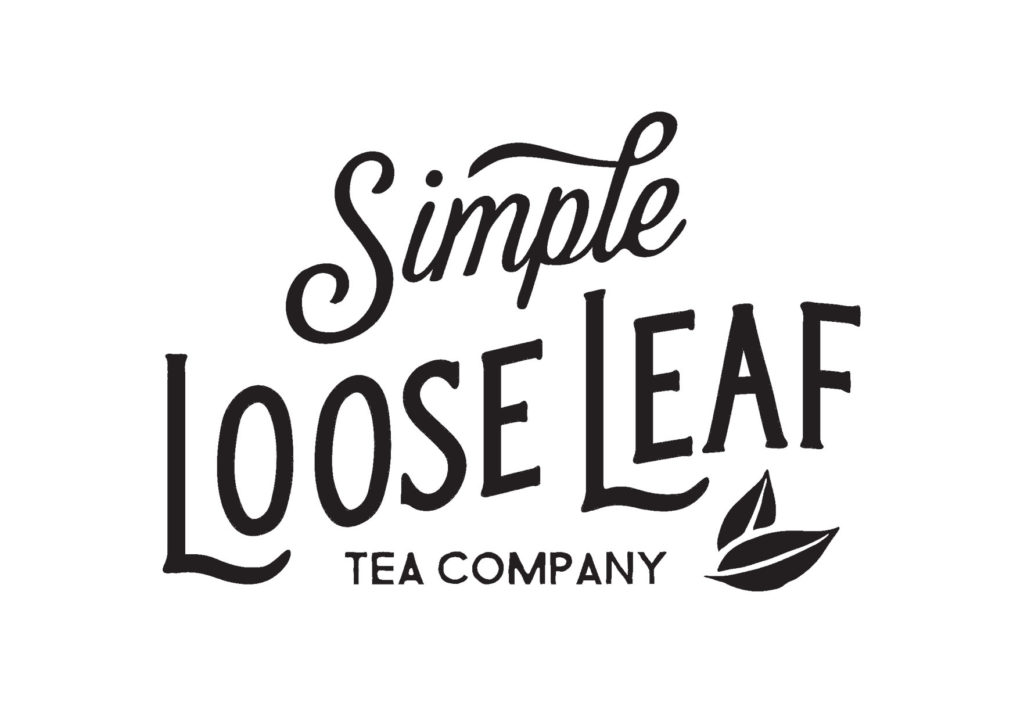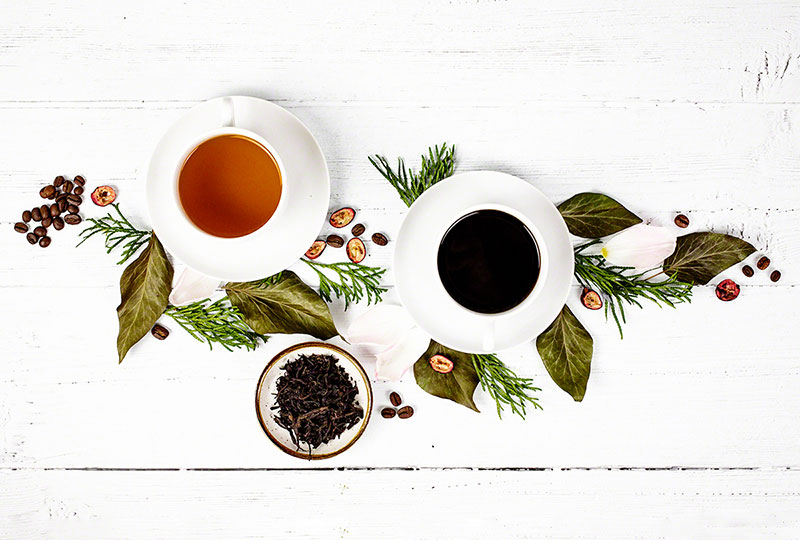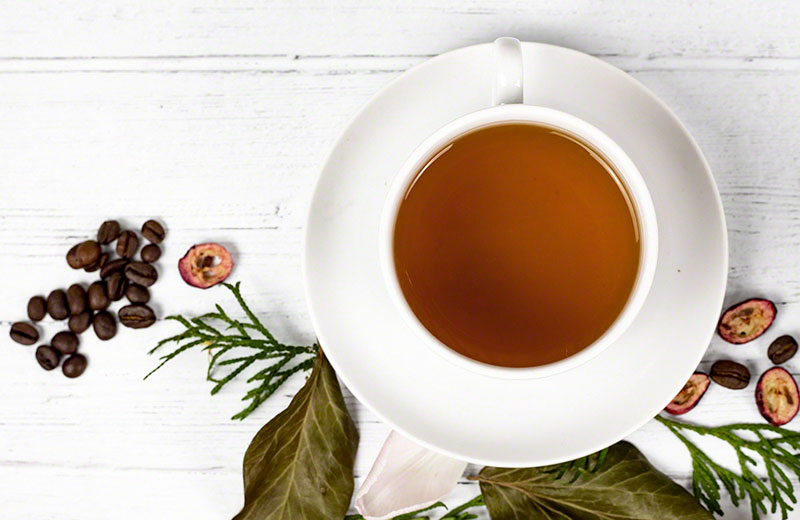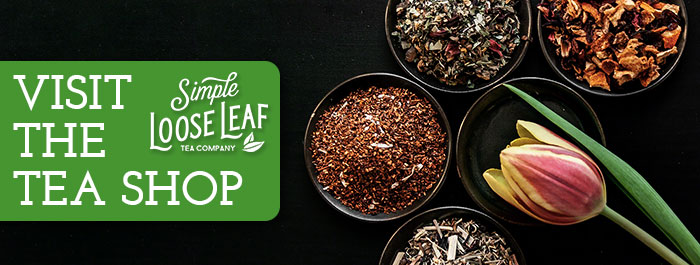Tea vs Coffee: Is tea or coffee better for you and why?
Maybe you are a coffee drinker that’s decided to drink less coffee. Or maybe you’ve decided to stop drinking coffee for good and need a caffeinated alternative. Can tea replace coffee? They can both taste delicious, they both contain caffeine and may offer many health benefits. But, which one is better?
Is tea better than coffee?
Deciding if tea really is better than coffee will ultimately depend on much more than just a scientific research. While tea has many beneficial compounds, so does the coffee. Usually, the best choice is the one you enjoy the most. Thankfully, we have thousands of tea and coffee types to choose from. All real teas are made from the same tea plant–Camellia sinensis. And they all contain caffeine and antioxidants and may help prevent type 2 diabetes, cancer, neurodegenerative diseases and affect mood[1]. Depending on the type, different tea may provide stronger or weaker benefits, but same is true for coffee.
Tea may be a wonderful option at any time of the day. On the other hand, drinking coffee in the afternoon or evening may cause a sleep disturbance. Why? Because a regular cup of coffee (unless decaffeinated) is very likely to contain much more caffeine than a regular cup of tea. Besides, some teas such as hojicha, kukicha or bancha contain less caffeine than others. If you want to avoid caffeine altogether, there are thousands of caffeine-free herbal teas to choose from.
Furthermore, if you are looking for the best flavor, tea may win again. Although today the world of coffee is full of delicious flavors, it will always be bitter. And many teas won’t, even the black types. So, if you are looking for a drink without bitterness, tea may be an answer.
Is tea healthier than coffee?
Usually, the main reason behind switching to tea is an intolerance to caffeine or experiencing side-effect like the jitters, anxiety or insomnia. Tea won’t give you the jitters, and there is a lower chance you will get overdosed on caffeine. Caffeine in coffee tends to give one caffeine spike, making you feel even more tired later, once the caffeine effect wears out. Tea has L-theanine, an important amino acid that may balance the effect on caffeine and provide more stable energy. L-theanine may provide other benefits too, increase calmness and benefit sleep.
Moreover, tea contains chlorophyll, another beneficial compound that judging by some research may be able to help cure some diseases and some forms of cancer[2].
The most beneficial compound in green tea is EGCg, a catechin responsible for many potential health benefits. In combination with caffeine, it may provide more benefits than pure coffee, such as increased fat oxidation and aiding weight loss. In fact, studies suggest that unfiltered coffee, unlike filtered coffee, may increase the level of bad cholesterol[3], and green tea may do just the opposite-significantly decrease it[4].
Interestingly, studies showed that drinking both coffee and tea may reduce mortality in both women and men[5]. Both tea and coffee may be beneficial for the brain and may protect against Alzheimer’s disease and Parkinson’s disease[6]. Drinking 3-5 cups of coffee may be related to lower risk of cardiovascular disease[7] and current studies suggest that tea may provide the same benefit[8].
What about the side-effects?
But don’t rush just yet to make an extra cup of green tea. Just like drinking too much coffee, drinking too much tea may result in a caffeine overdose. And in an EGCG overdose as well. Symptoms of caffeine overdose may include nervousness, sleeping problems, and anxiety. While you may see the side effects of a caffeine overdose very fast, EGCG may cause some problems too. However, although the daily recommended dose of EGCG is 800 mg[9], there is little to no evidence that drinking tea caused any cases of serious overdose. In fact, they are normally related to EGCG supplements instead.
Still, drinking 10 cups of matcha tea per day would be unadvisable, no matter how healthy it is. One study showed that the average amount of EGCG in green teas is around 70-120 mg per gram of tea leaves.[10] [11]The only exception among black teas, usually much lower in EGCG, is Darjeeling, with an amount of 85 mg of EGCG in one gram of dry leaf[12]. Similarly, drinking 10 cups of coffee wouldn’t be recommended too. Conclusion? Both of them may be very beneficial if taken in moderate amounts. It’s likely that 5 cups of regular tea or coffee may not cause any problems at all. If you are an avid tea or coffee drinker and drink even more than 5 cups per day, pay attention to how your body responds and consult your doctor if needed.
Studies showed that caffeine may have potential benefits such as improving cognitive function and help relieve the pain, but there are many potential side-effects too, especially if you are sensitive to caffeine or have some other underlying medical problems. Children and pregnant and breast-feeding women should avoid caffeine as much as possible.[13]
While they are both amazing drinks, if you want more benefits and less caffeine, tea may be a better choice.
How much caffeine in Coffee vs tea
Caffeine is found in many caffeinated beverages. One survey reported that the range of caffeine intake per day in women is from 49 to 1022 mg per day. This range suggests that caffeine is, indeed, a very favorable ingredient in our diets. However, studies suggest that the intake should be limited to around 400 mg per day for a healthy adult, although 500 mg shouldn’t cause toxicity[14], but may cause some other health problems. With drinking around 5 cups of tea per day, you are very unlikely to reach that level. However, with drinking only 2 big cups of coffee, you may be well over the limit.
Green tea caffeine vs coffee
Green tea has anywhere between 10 mg to 60 mg of caffeine per cup and in some cases, may be as strong as a weaker cup of coffee. The caffeine content in green tea will depend on the type of tea plant, growing and harvesting methods, processing methods, brewing style and others. The tea you brew at home will have more caffeine than the ready to drink bottled tea[15].
Studies imply that drinking green tea with lower caffeine content may reduce stress and improve the quality of sleep[16]. On the other hand, caffeine alone may have a significant disruptive effect on sleep if taken 6 hours (or less) before going to bed[17]. That’s because tea contains L-theanine, and in the mentioned study, low caffeine teas had about 3 times less caffeine and 2 times more L-theanine than regular green teas.
Green tea with high and low caffeine content
As we already mentioned, it’s impossible to say how much caffeine will your cup have. However, some teas are naturally higher or lower in caffeine. High caffeine green teas are matcha, gyokuro, kabusecha and other shaded green teas, often sencha, and often Indian green teas such as Makaibari or Guranse green tea. The most popular low caffeine green teas are kukicha, bancha, roasted type of green tea hojicha and genmaicha made from bancha.
Another way to reduce the caffeine content is choosing flavored or blended teas, that have a high ratio of other ingredients. One teaspoon of a tea blend will, therefore, contain less caffeine than one teaspoon of pure tea. 3-5 cups of green tea per day are likely to be well tolerated by a healthy individual.
Black tea caffeine vs coffee
Expect a cup of black tea to have around 20 to 80 mg of caffeine. Although some may have more or less, on average it will provide less caffeine than a cup of home-brewed coffee. Expect around 40 to 50 mg of caffeine per cup of black tea.
Brewing has a lot of influence on the caffeine content in the cup of black tea. Caffeine is best extracted with hotter water, and black tea leaves are almost always steeped in boiling water. If you want to influence the caffeine levels, try brewing your tea leaves with cooler water. However, keep in mind that this will influence the flavor as well.
Both black decaf tea and decaf coffee have the same amount of caffeine–around 2 mg per cup[18].
Black teas with high caffeine content
Many black teas have a very high caffeine content. Usually, Assam teas contain a higher amount of caffeine than other Indian black teas, such as Darjeeling. However, this will ultimately depend on many factors. That’s why pure Darjeeling from one producer may have more caffeine than English Breakfast from the other, and Earl Grey may have more caffeine than Darjeeling tea. Broken leaf black tea is likely to give a stronger cup too.
Tea bags vs loose leaf tea caffeine content
Tea bags will usually contain much more caffeine than loose leaf tea. Why? Because tea bags usually contain tea dust or small tea particles called fannings. They will release more caffeine than loose leaf tea.
Coffee
One study suggested that the average amount of caffeine in a home-brewed coffee was around 80 mg[19] per cup. Coffees bought from some coffee chains may have much more–even more than 300 mg in a cup 16 oz cup. That’s almost the daily caffeine allowance for many people.
Every single tea and coffee are different, and without a test, it’s impossible to say how much caffeine your cup contains. Start with a small cup first and see how you feel. Moreover, everyone reacts differently to caffeine and some people may show no side effects even at high doses, while for some, even the smallest dose may disrupt the quality of life.
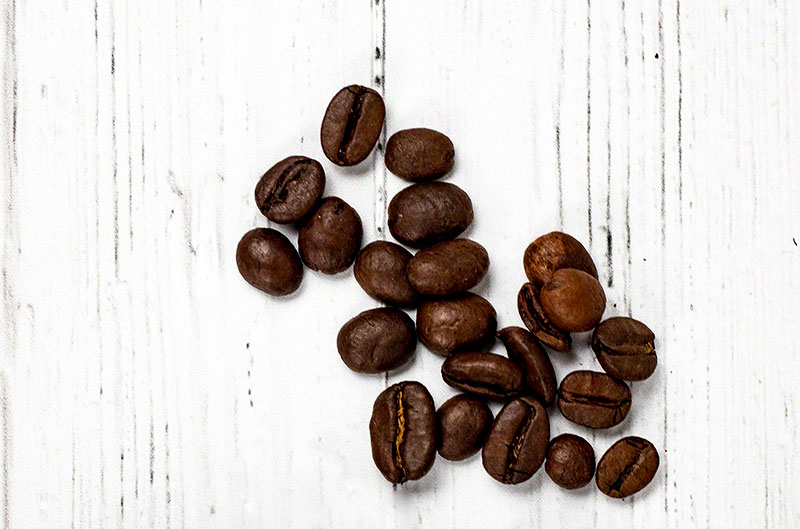
Roasted coffee beans
Teas to drink instead of coffee
There are many teas you can try if you want to replace coffee for good. It’s important to know that tea won’t give you the caffeine rush, but it will give enough energy to survive the stressful morning.
Teas to drink if you like the taste of coffee
If you like the strong coffee flavor, you can replace your morning cup with a full bodied strong malty tea.
1. If you like to drink your coffee pure
One of the strongest full bodied tea in the world is Irish Breakfast. This blend tends to be much more robust than a regular cup of English Breakfast and may be a good replacement for a cup of morning coffee. It can be so thick that you may actually be able to see reflections on the surface in colors. Drink it straight without any sweeteners or milk.
2. If you like lattes
The best replacement for a regular latte is Indian Chai. Chai is made with strong black tea boiled with milk. A spicy alternative is a Masala Chai, a tea with strong black tea, milk and spices.
3. If you drink coffee with milk and sugar
Nothing beats a cup of English Breakfast with sugar and milk. English Breakfast is a strong, robust and malty, and a good way to start any morning. For a healthier alternative, replace sugar with other sweeteners.
4. If you prefer flavored coffee
Besides being malty, some Assam teas may have a strong chocolate note. Yunnan teas have a chocolate note too.
Teas to drink if you want more caffeine
If impossible to say how much caffeine is in each and every tea. However, it’s still possible to guess which type will have a higher caffeine content.
1. Choose teas with broken leaves
Teas with broken leaves will release much more caffeine than full unbroken leaf. Assam and Ceylon teas tend to have more caffeine than other black teas. The stronger the leaf, the higher the chance of getting more caffeine in one brew. However, if you want to re-steep the same leaves, you may get the same amount.
2. Choose teas with smaller and younger leaves
Younger leaves have more caffeine than old mature tea leaves. Teas from first and second harvest will possibly have more caffeine than those from later winter harvests.
3. Japanese shaded green teas tend to have a high caffeine content
Although many green and white teas may have more caffeine than some black teas, you can’t miss with shaded teas like Gyokuro, Kabusecha and Matcha. 2 grams of matcha may provide you with about 60 mg of caffeine.
4. Brew tea for 3-5 minutes
Caffeine needs both time and the right temperature to be released into water. Black tea is usually brewed with nearly boiling water and for at least 2-3 minutes. Brew it a little longer if you want to release more caffeine.
Want to stop taking caffeine for good? Find out what are the caffeine free teas that may help boost morning energy.
Final Verdict: Is tea better for you than coffee?
There are thousands of different teas and coffees available in the world. Which one is healthier will depend on the way it’s grown, harvested, produced, stored and brewed.
However, judging by the studies, tea may be a much better and healthier choice than coffee. Firstly, a regular cup of tea is likely to contain less caffeine than coffee. Tea contains other compounds too, that may work together with caffeine to provide other benefits–such as fat burn; or minimize the negative effects of caffeine–such as the jitters. Besides, if you don’t like bitter drink, tea is a much better choice. There are many teas that are not bitter at all – for example Nuwara Eliya black tea or Kukicha green tea. Also, once your taste buds get accustomed to all the new flavors, you will drink it with no sweeteners or other condiments.
And last, tea may give you a chance to relax, and enjoy the ritual of brewing and slowly sipping and enjoying dozens of flavor nuances. Looking for a high-caffeine tea to replace your morning coffee? Read what are the 10 best high caffeine teas.
Disclaimer: This article is for informational purposes only. It’s not intended to replace medical advice, diagnosis, or treatment. Every person is different and may react to different herbs and teas differently. Never use teas or herbs to treat serious medical conditions on your own. Always seek professional medical advice before choosing home remedies.
References:
[1] https://www.researchgate.net/publication/283502487_Medicinal_Uses_of_Chlorophyll_A_Critical_Overview
[2] https://www.researchgate.net/publication/283502487_Medicinal_Uses_of_Chlorophyll_A_Critical_Overview
[3] https://www.health.harvard.edu/blog/pressed-coffee-going-mainstream-drink-201604299530
[4] https://www.health.harvard.edu/blog/pressed-coffee-going-mainstream-drink-201604299530
[5] https://www.ncbi.nlm.nih.gov/pmc/articles/PMC5871637/
[6] https://www.ncbi.nlm.nih.gov/pubmed/20182054
[7] https://www.ahajournals.org/doi/full/10.1161/CIRCULATIONAHA.113.005925
[8] https://www.sciencedirect.com/science/article/abs/pii/S0924224419300342
[9] https://www.ncbi.nlm.nih.gov/pmc/articles/PMC4419223/
[10] http://hera.ugr.es/doi/1507920x.pdf
[11] Lan-Sook Lee, Sang-Hee Kim, Young-Boong Kim and Young-Chan Kim: Quantitative Analysis of Major Constituents in Green Tea with Different Plucking Periods and Their Antioxidant Activity
[12] http://hera.ugr.es/doi/1507920x.pdf
[13] https://www.ncbi.nlm.nih.gov/pmc/articles/PMC5445139/
[14] https://www.ncbi.nlm.nih.gov/pmc/articles/PMC5445139/
[15] https://www.mayoclinic.org/healthy-lifestyle/nutrition-and-healthy-eating/in-depth/caffeine/art-20049372
[16] https://www.ncbi.nlm.nih.gov/pmc/articles/PMC5703787/
[17] https://jcsm.aasm.org/doi/10.5664/jcsm.3170
[18] https://www.mayoclinic.org/healthy-lifestyle/nutrition-and-healthy-eating/in-depth/caffeine/art-20049372
[19] https://www.ncbi.nlm.nih.gov/pubmed/3366410
